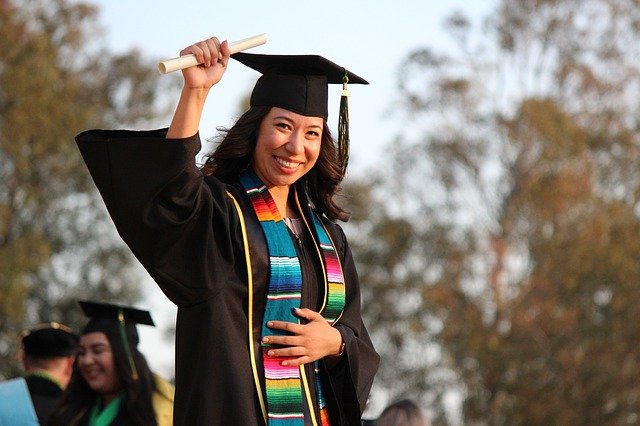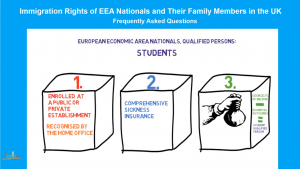
EU Citizens in the UK: STUDENTS
In today’s post I am explaining rights of STUDENTS
How can an EEA national student prove that s/he is a Qualified Person for the purposes of EU law? And why should they prove this in the first place?
This is because only those EEA nationals who become Qualified Persons may remain the UK after 3 months. This rule applies to EEA national’s family members as well. Students can only bring over their spouses and dependent children.
An EEA national exercising their free movement rights in the UK as a student must pass a threefold test:
They should prove that:
-
They are enrolled for the main purpose of following a course of study (including vocational training) at a public or private establishment which is:
o financed from public funds
o recognised by the Home Office as an establishment accredited to provide such courses or training
-
They have comprehensive sickness insurance (CSI) cover in the UK for themselves and any family members
-
They gave enough money to meet their living expenses without claiming benefits in the UK
Now, let me show you have the Home Office calculates this:
-
the first thing they do is they check the EEA national’s source/s of income.
To help them do that, you should provide the decision maker with one or more of the following:
-

EU Citizens in the UK: SELF-EMPLOYED PERSON bank statements showing your savings
- evidence of pension payments (if any)
- receipt of educational grants from overseas
- income of a partner, a spouse or other family members to which you have regular access. For example: funding’s by parents or a spouse. Please bear in mind that if your or a spouse are in the UK, you will also need to provide evidence confirming that they can work in the UK. This is, of course, is not a full list of the documents, which can be provided. So, basically, you should provide documents proving all sources of income.
And the next stage is:
-
assessing your and your family’s essential outgoings;
This done by assessing your financial commitments. The UKVI will consider the following factors: Rent, mortgage, utility bills, loan, credit cards and other personal debt payments and additional costs, such as travel, food costs, etc.
and the last step is:
-
deducting the essential outgoings amount from your income.
If you have a surplus, this means that you’ve passed the test and are likely to be recognised as a Qualified Person for all purposes of EU law.
If you’ve watched my previous video, you’ll notice that students and self-sufficient persons should pass exactly the same self-sufficiency test and both categories should have comprehensive sickness insurance as well.
So, the only difference between the two is the fact that students should provide evidence of their education in the UK.
Students can only bring over their spouse and dependants children to the UK. However there is no restriction for self-sufficient persons and they can invite any direct or extended family members to the UK as long as they can prove their financial credibility to look after them. This is something you should bear in mind when deciding if you should apply as a student or as a self-sufficient person.
Students can assure the Home Office that they have sufficient resources not to become a burden on the social assistance system by making a declaration. Where students choose to make such a declaration they must confirm that they meet the requirements relating to having sufficient resources.
If your declaration is not clear or detailed enough the UKVI will either ask you to provide them with further information or they simply refuse the application.
